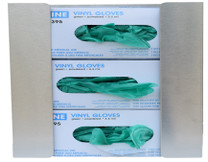Doctors and other medical professionals hold the incredibly important job of keeping our communities healthy and properly healed. Being close to patients who have infectious illnesses and may have other issues unknown to the provider or nurse can be unsettling. Doctors and nurses may have families they come home to and could potentially spread illnesses they came into contact with. The Food and Drug Administration (FDA) places emphasis on the importance of wearing medical gloves, which are products that medical professionals are accustomed to using. As a healthcare worker, reaching for the Glove Holder is something that is done every day, and for good reason.
Medical gloves act as a barrier between a contagious fluid or rash when working with a patient. They also help to keep hands clean and free of debris or fluids, although medical professionals are recommended to wash hands before and after glove wear. Many individuals are allergic to latex, which could be a key material used in the manufacturing of medical equipment like bandages and items filling the Glove Holder. Because of this, it is important for physicians’ offices, hospitals and clinics to offer latex-free gloves. The FDA notes that there are various types of gloves used in the healthcare industry, including those for exams, chemotherapy and surgery. The products that go into an office’s Glove Holder are checked by the FDA to make sure they offer sufficient protection. Gloves that come right out of the box are sterile for the protection of patients and providers.
There are some precautions to take for nurses and doctors when working with medical gloves. There are different sizes offered, and there should be a variety available in the Glove Holder for personnel. An employee should ensure the gloves are the correct size so they are not too big, and thus prone to falling off, and not too small, which could make the gloves tear more easily. It is essential to monitor the gloves while worn to be sure that they do not develop holes. Having a tear in a medical glove means the product is not doing its job and leaves the worker vulnerable to infection. Following a rip or tear, as well as after seeing a patient, gloves should be discarded. As mentioned earlier, hands should be washed before and after use, even if the gloves did not rip. With proper use of medical gloves, medical professionals have a better chance of preventing the spread of illnesses.

